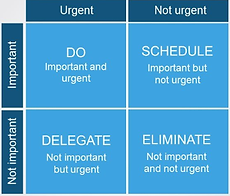Your Coachee always puts off or delays tasks, even when they require immediate attention. Tasks will often get done very last minute.

Limiting Beliefs
Your Coachee needs to identify common limiting beliefs that prevent him/her from living the life that he/she desires and reshapes them positively. A Limiting Belief could be “I need to do things perfect” It’s not that I failed, it’s that I didn’t have enough time to succeed”– struggling to make decisions because he/she is always looking for the perfect outcome.
Ask your Coachee to imagine and write on a paper his/her life if money and time was no issue. Write as many details as possible. Step 2: ask your Coachee that are preventing him/her to reaching this dream life. Step 3: ask him/her write the childhood negative stories he/she tells himself/herself such as "my parents were poor", "my father was violent". Is there any overlap between Step 2 and 3. Analyse the answers.
GoMasterCoach app, including Limiting Beliefs

The 360
The 360 helps highlight the difference between the perception of self and how others see the person. The 360 may help bridge that gap.
Think of 5 people whose opinion your Coachee respects and trusts. Ask them for a 360 feedback. For example: what are the coachee's key strengths, achievements, what they value the most about your coachee and one area of improvement.
GoMasterCoach app, including 360

Break the Habit of Procrastinating
Procrastination is an habit that can be broken. The trigger of procrastination is always stress. Avoiding doing something, often through distraction, gives the Coachee a stress relief. Make the Coachee acknowledge the stress and break the habit right ahead, not indulging into a distraction.
GoMasterCoach app, including Tools and Programs
Common Symptoms
-
Always putting off or delaying tasks, even when they require immediate attention
-
Often late for appointments
-
Often on social media
-
Having uncertain goals
-
Spending too much time dreaming about the future
-
Feeling overwhelmed
-
Giving lousy excuses for not delivering on time
-
Experiencing difficulty concentrating
-
Holding onto negative beliefs
-
Experiencing personal problems
-
Becoming or being easily bored
-
Setting unrealistic goals
-
Being afraid of failure
-
Low self-esteem
4 Techniques
to Help Overcome Procrastination

The Eisenhower Matrix
The Eisenhower Matrix, also referred to as Urgent-Important (UI) Matrix, will help your Coachee decide on and prioritize tasks by urgency and importance, sorting out less urgent and important tasks which he/she should either delegate or not do at all. Procrastinators have a tendency to set unrealistic goals. Make sure the tasks and goals are SMART (specific, measurable, achievable, relevant, and time-based). Break the tasks down.
Ask your Coachee to list his/her tasks positioning them in the matrix below. Analyse where most tasks are, then for each quadrant, do as mentioned:

GoMasterCoach app, including Eisenhower Matrix
Sources:
-
The Impostor Syndrome: Becoming an Authentic Leader, by Harold Hillman, Chris Abernathy, et al
-
The Mindfulness Workbook for Addiction: A Guide to Coping with the Grief, Stress and Anger that Trigger Addictive Behaviors (A New Harbinger Self-Help Workbook), by Rebecca E. Williams PhD and Julie S. Kraft MA
-
Coach's Casebook, by Kim Morgan
-
Compassion for All Creatures, by Janice Gray Kolb
-
Perfectionism: A Practical Guide to Managing "Never Good Enough", by Lisa Van Gemert
-
The Fulfillment of All Desire, by Ralph Martin
-
Happier: Learn the Secrets to Daily Joy and Lasting Fulfillment, by Tal Ben-Shahar
-
The Disease To Please: Curing the People-Pleasing Syndrome, by Harriet B. Braiker


